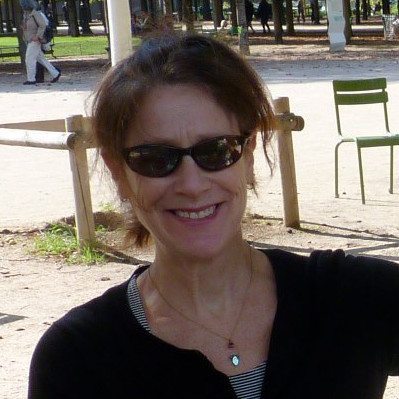“Let’s stumble through the scenes,” Kate Merrigan says. “It’s going to be messy.”
Two weeks have gone by since I’ve been at a PMP session. If this is “messy,” then come performance time, these scenes are going to be spectacular. Tonight’s rehearsal takes place in a new space—a tiny anteroom, in fact—and to my untrained eyes, their movements are still fluid and natural. But Kate asks them to try again. Think about how the blocking informs their characters. Off they go, and yep. Kate’s right. It’s much tighter this time around.
Hide and go seek. PMP kids are comfortable enough to get lost and confident enough to keep searching for the emotional backbone of the scene.
* * *
When I was a kid, my first bike was a blue Schwinn. Every summer morning, I’d take off, sometimes until dinner. I didn’t have a destination. And once I rode past the familiar touchstones that defined my neighborhood (baseball diamond, swimming pool, highway overpass, climbing tree), I was on my own. My only GPS was pure intuition.
Lou Volpe, the subject of Drama High, a new book by Michael Sokolove, knows a lot about the importance of kids getting lost and finding their way. He has spent four decades as theater director at a school with more than its share of personal and economic challenges and still managed to create extraordinary theater. But that isn’t the real miracle. The miracle is that he breaks down the fortifications that divide “jocks”, “scholars”, and “artists”. That he also creates powerful art seems to be a happy accident. “I’m not in the entertainment business,” he says. I think what he means is best explained a young actor, who discovers that “there’s more parts of me than I realized before.”
Volpe’s drama department operates on an infinitesimal budget. Not too far away, Philadelphia’s Main Line, there are other schools with state-of-the-art auditoriums and lighting boards that rival professional theaters. The student actors in these districts can avail themselves of private voice, acting, and movement training. After graduation, some of them will partake of internships or experiential “gap” years before “real life” commences.
With all sincerity, I wish them well. They’re kids, after all, and all kids deserve the best.
But try this PMP exercise on for size:
Create a scene.
Maybe the scene’s about a freshman trying to navigate a high school hallway. Coming home to an empty house. Confronting a teacher. Soothing a friend in despair. Starting minimum-wage job at the end of a long school day.
Talk about “experiential” and “real life”.
My guess is that if you eliminate the state-of-the-art auditorium and fancy lighting board, every young person, no matter how privileged or pre-determined their life may seem, still spends every minute of every day heading into emotional territory as unscripted as any improv.
That’s terrifying. But it can also be exhilarating.
Like deliberately getting lost on your bike.
Especially if the bike is a single-gear Schwinn.
Meet our PMP Blogger
 Jane Denitz Smith is a proud member of Dramatists Guild, through whose aegis she recently held a staged reading of Death by Chocolate and Barbecue, new full-length plays. Most recently, Spread My Ashes By the Rental was part of the Made in the Berkshires Festival. Last May, Mary Durning’s Soup and Other Cultural Divides was included in Boston Theatre Marathon. Ten-minute plays have workshopped in Jen Whiting’s Ten-Minute-Play Workshop podcasts and, in 2011, scenes from After Prom, a full-length play, were staged as part of the Berkshire Festival of Women Writers. Jane is the author of three Young Adult novels, published with HarperCollins. She teaches and lives with her family in Williamstown, Mass.
Jane Denitz Smith is a proud member of Dramatists Guild, through whose aegis she recently held a staged reading of Death by Chocolate and Barbecue, new full-length plays. Most recently, Spread My Ashes By the Rental was part of the Made in the Berkshires Festival. Last May, Mary Durning’s Soup and Other Cultural Divides was included in Boston Theatre Marathon. Ten-minute plays have workshopped in Jen Whiting’s Ten-Minute-Play Workshop podcasts and, in 2011, scenes from After Prom, a full-length play, were staged as part of the Berkshire Festival of Women Writers. Jane is the author of three Young Adult novels, published with HarperCollins. She teaches and lives with her family in Williamstown, Mass.
